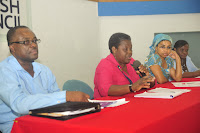 |
| Dede Bedu-Addo |
Mrs Dede Bedu-Addo, Coordinator of Ghana Monitoring & Evaluation Forum (GM&EF) has expressed her delight that Ghana is the first Anglophone country in West Africa to host the Conference of the AfrEA.
Speaking to Reportage at the conference centre, Mrs Bedu-Addo said, “It is a big honour, and I think it came at a good time, when we are all talking about monitoring, especially as we are an election year. I think it will help bring focus to what we expect of our government.”
It brings a lot of good prospects for the future also, she said. “We get to meet other people in E&M, and learn how the processes are being practiced in countries and institutions elsewhere. We can share and learn with different people from all over the world.”
While the conference will create great networking opportunities for participants who will pick new skills and techniques, we also hope that it will create more understanding of the weaknesses and lapses in M&E, especially in Africa, where poverty is rife.
“Poverty has a way of making you think of the short term. M&E is a long-term developmental solution. Where resources go and how they are used is not very good. We hope that after this conference, we can go back and ask how our resources are being used and how we can hold people responsible for it,” she said.
“Anybody who lives on a budget, or has money coming in periodically needs to do M&E” Basically, they need to stop and check, and ask themselves where all the money went.”
This year’s conference is designed to help participants to be better equipped to meet the challenges of the times. It is a forum to use to build capacity for long-term benefit.
As a local association, the GM&EF found there is a lot of interest in monitoring and evaluation, especially in government circles, although, unfortunately it appears the “talk doesn’t go with the walk, largely because, often, there is not enough capacity, and the tools with which to work are unavailable, particularly, funding.”
But, Mrs Bedu-Addo believes that the networking and dialogue that will ensue at this year’s conference will help generate ways of building other tools that will help practitioners make more informed decisions.















